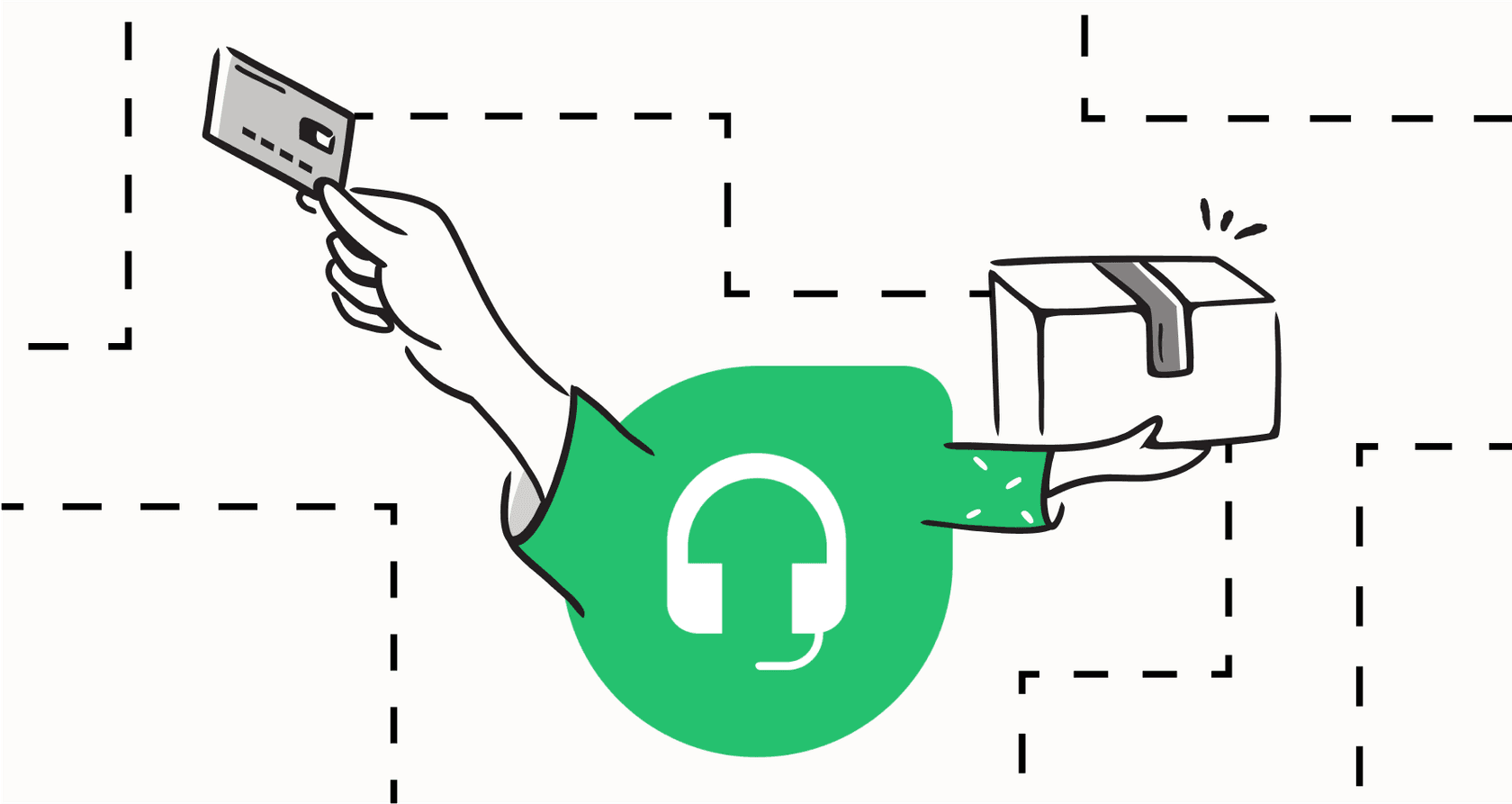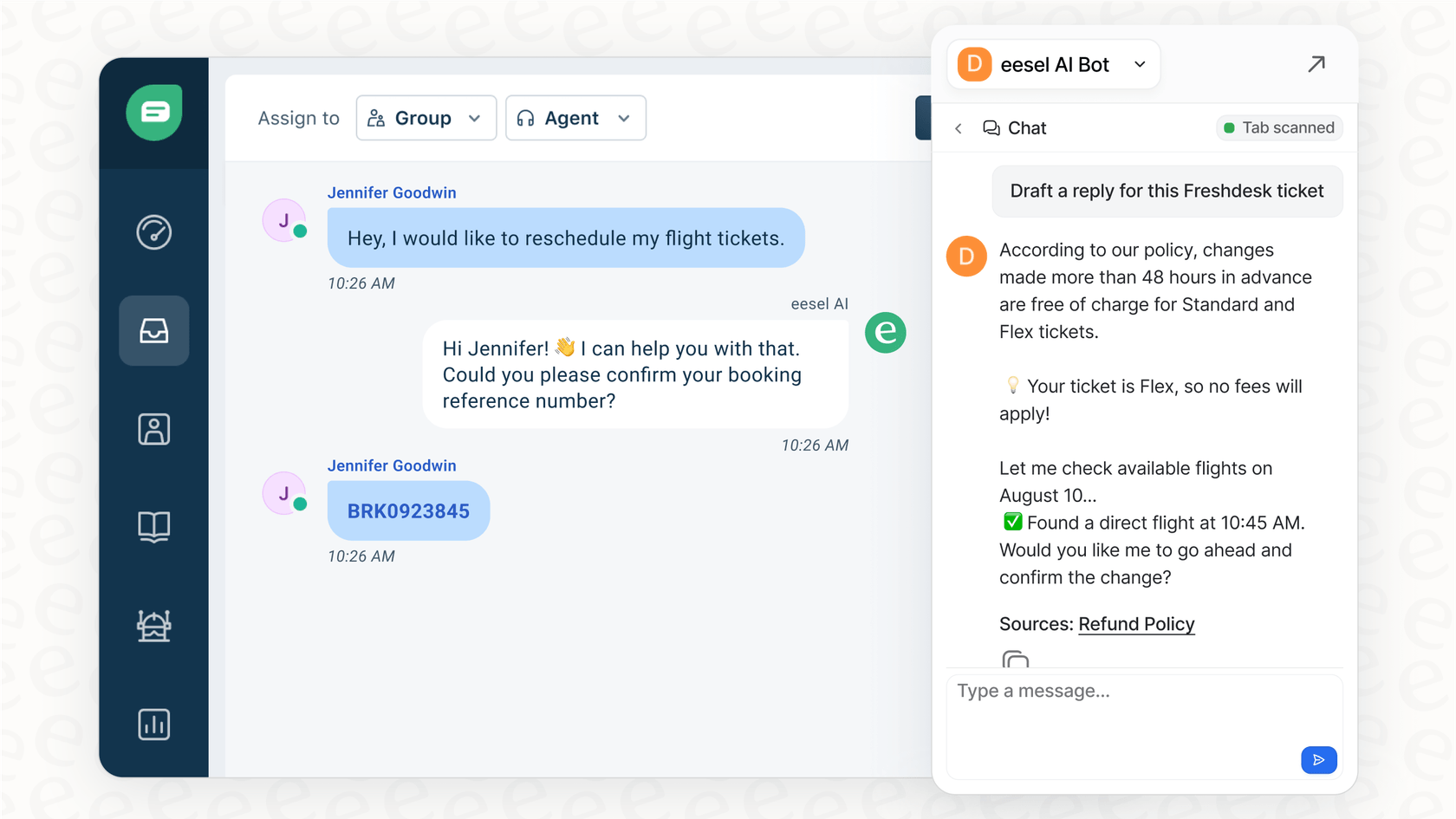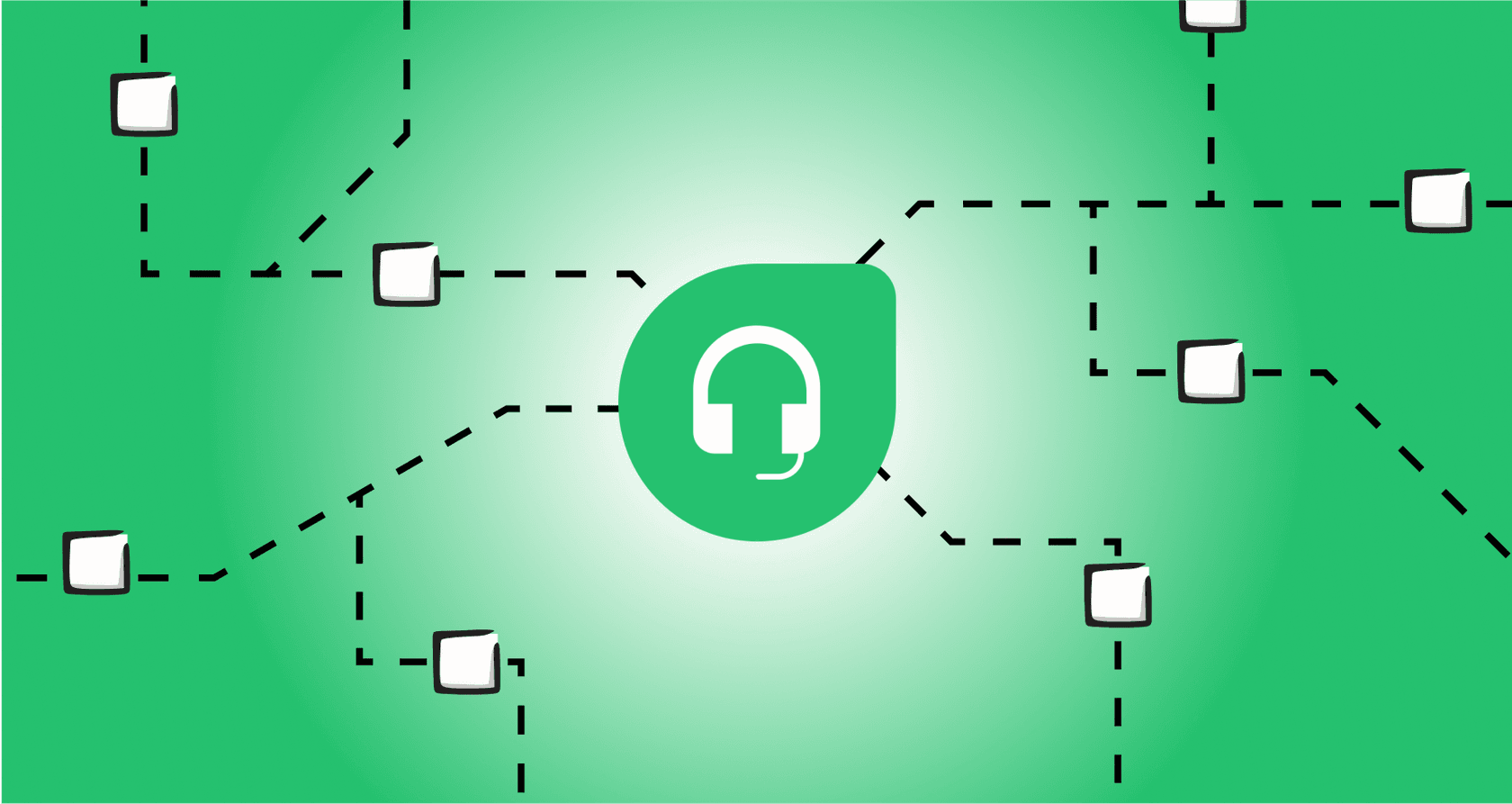A Freshdesk workflow to assign tickets by skill rules: A 2026 guide

Stevia Putri

Stanley Nicholas
Last edited January 16, 2026
Expert Verified

Figuring out who should handle which support ticket is a classic challenge for any growing team. When you get it right, customers get quick, expert answers from the best person for the job. Freshdesk provides a reliable foundation for this by allowing you to build structured, reliable routing systems.
A common way to tackle this is by setting up a Freshdesk workflow to assign tickets by skill rules. It's a proven step toward maintaining a organized and efficient unassigned ticket queue.
In this guide, we’ll walk through exactly how to set this up using Freshdesk’s robust native tools. We'll also look at how to get the most out of these rule-based systems and explore how modern AI can serve as a powerful, complementary partner to help get tickets to the right person every single time.
What is a Freshdesk workflow to assign tickets by skill rules?
Simply put, it’s a process you build inside Freshdesk that automatically sends incoming support tickets to agents based on their specific areas of expertise. This creates a structured environment where the system directs tickets to the people most qualified to solve them.
To make this work, you use several features from the Freshdesk ecosystem:
-
Skills: These are useful labels you create for your agents' expertise, such as "Spanish-speaking," "Billing issues," "Tier 2 technical," or "Refunds specialist."
-
Automation rules (workflows): This is the logical engine that runs the show. You create rules that tell Freshdesk what to do when a ticket with specific properties shows up. For instance, IF a ticket subject line contains "invoice," THEN assign it to the "Billing" group.
-
Assignment methods (Omniroute/IntelliAssign): Once a workflow sends a ticket to the right group, this part handles the final delivery. You can pass tickets out evenly (round-robin), send them to the agent with the lightest workload, or match them to an agent with the specific skill needed.
By utilizing these features, you can build a highly effective routing system right inside your helpdesk.
graph TD A[Incoming Ticket] --> B{Scan Subject/Description}; B -->|Contains 'Refund'| C[Assign to 'Billing' Group]; B -->|Contains 'Invoice'| C; B -->|Other Keywords| D[Assign to 'General' Group]; C --> E{Omniroute Logic}; D --> E; E -->|Round-Robin| F[Agent 1]; E -->|Load-Balanced| G[Agent 2]; E -->|Skill-Based| H[Agent 3];
How to set up a native Freshdesk workflow to assign tickets by skill rules
Alright, let's walk through how to build this. Freshdesk makes it straightforward to define skills and build the logic that keeps your team running smoothly.
Step 1: Define and create agent skills
Before you can assign anything based on skill, you define what expertise looks like for your team. A good place to start is your ticket history. You might find common topics fall into clear buckets:
-
Language: Spanish, French, German
-
Product line: Product A, Product B
-
Issue type: Billing, Technical, Shipping, Refunds
-
Complexity: Tier 1, Tier 2, Escalations
Once you’ve got your list, head into Freshdesk’s admin settings. The platform provides a dedicated area to create new skills, giving each one a name and description to lay the groundwork for your routing.
Step 2: Assign agent skills
With your skills created, you can now map them to your team members. In the user skills management area, Freshdesk allows you to easily connect each skill to the right people.
You can even set priority levels. If you have an agent who is a billing expert but can also assist with general questions, you can make "Billing" their priority 1 skill. This ensures Freshdesk prioritizes billing tickets for them, maximizing the use of their specialized knowledge.
Step 3: Build the automation rules
This is where you configure the logic that powers your routing. These rules scan new tickets for the specific triggers you've defined.
Here’s an example of a rule for routing refund requests:
-
Go to Admin > Workflows > Automations.
-
Create a new rule that runs on Ticket Creation.
-
Set the Condition: "If Subject or Description contains 'Refund'".
-
Set the Action: "Assign to Group 'Billing'".
Now, when a new ticket arrives with "refund" in the content, Freshdesk will automatically send it to your Billing group, ensuring a smooth and organized process.
Step 4: Choose an assignment logic (Omniroute)
The final step is determining how tickets are distributed within a group. Once your workflow sends a ticket to the Billing group, Omniroute provides several professional methods to handle the assignment:
-
Round-robin: This distributes tickets one by one to keep the workload perfectly balanced across the team.
-
Load-balanced: This method sends tickets to the agent with the fewest open tickets, ensuring fast response times by focusing on availability.
-
Skill-based: This targeted option looks for an available agent within the group who has the specific skill required for that ticket.
By combining these methods, you build a comprehensive workflow that manages ticket routing with professional efficiency.
Considerations for native Freshdesk workflows
While setting up a Freshdesk workflow to assign tickets by skill rules is a powerful way to organize your support, there are some factors to keep in mind to ensure long-term success.
Workflows provide precision through rule-based logic
Rule-based systems are excellent because they follow your instructions exactly. However, they rely on specific keywords. If a customer uses phrasing that isn't in your rules, such as "I need my money back" instead of "I want a refund," the ticket may need manual sorting.
As your business grows and you add new products or services, you'll want to regularly review and update your rules. Keeping your workflows aligned with how customers describe their issues is key to maintaining a high level of automation. As some users in the Freshworks Community have discussed, it is important to configure rules precisely to ensure they execute exactly as intended.
Focus on keyword-specific routing
Freshdesk’s native automation rules are highly effective at processing information within the helpdesk. They provide a reliable way to route tickets based on the data provided in the ticket itself.
For teams that need to pull context from a variety of external sources - like Slack, Confluence, or Google Docs - an AI add-on can be a great way to provide additional layers of intelligence to your existing Freshdesk setup.
Configuring and testing your workflows
The process of managing skills and logic is a comprehensive part of support administration. When building new workflows, it's important to monitor them closely.
While native rules are applied directly to live tickets, you can ensure a smooth rollout by implementing rules gradually and using Freshdesk's excellent reporting to track their impact. This careful approach helps you refine your logic and maintain a great experience for your customers.
For teams looking to add more flexibility, you can connect your helpdesk to an AI tool like eesel AI, which can learn from your ticket history and provide a complementary way to manage assignments alongside Freshdesk.
A smarter alternative to native Freshdesk workflows: eesel AI
While native workflows are a fantastic foundation, AI-powered platforms like eesel AI offer a complementary way to handle ticket assignment. They work within your Freshdesk environment to provide intelligent automation that understands broader context.
Get up and running in minutes
eesel AI offers a simple one-click integration that works alongside your current setup. You can connect it to your Freshdesk instance and have it ready to assist your team in minutes. It’s designed to be a self-serve enhancement that doesn't require you to change your existing tools or daily routines.
AI that understands the broader context
Products like AI Triage and AI Agent add an extra layer of insight to your routing. By learning from your historical data, the AI helps understand the nuance and intent behind customer requests, recognizing what a "billing issue" looks like for your specific business.
Furthermore, it can connect with other company knowledge sources like Confluence or Slack. This allows it to support your Freshdesk workflows with even more context, ensuring tickets are routed with a high degree of understanding.

Test with risk-free simulations
A great benefit of adding AI is the ability to run simulations. eesel AI allows you to test your setup on historical tickets in a safe environment before going live.
You can see how the AI would have tagged and routed past conversations, allowing you to fine-tune the behavior with zero risk to your current operations. This serves as a perfect safety net that complements your manual Freshdesk rules.
Pricing comparison: Native Freshdesk workflows and eesel AI
When planning your automation strategy for 2026, it helps to understand the tiered options Freshdesk offers. Freshdesk provides a range of plans to suit different team sizes and needs.
| Freshdesk Plan | Price (Billed Annually) | Key Automation/AI Features |
|---|---|---|
| Growth | $15/agent/month | Basic ticketing, help center |
| Pro | $49/agent/month | Custom objects, advanced ticketing & reporting |
| Pro + AI Copilot | $78/agent/month | Pro features + Freddy AI Copilot |
| Enterprise | $79/agent/month | Everything in Pro + additional security and workflows |
To access Freshdesk's own native AI, "Freddy AI Copilot," the Pro plan can be enhanced with an add-on, providing a comprehensive enterprise-grade solution.
eesel AI offers a straightforward, flat-rate model that includes its main products like AI Agent, Copilot, and Triage. It's designed to be a predictable addition to your budget, with no per-resolution fees and flexible monthly options that fit easily into your existing Freshdesk investment.
The takeaway on assigning tickets by skill in Freshdesk
Setting up a Freshdesk workflow to assign tickets by skill rules is a smart and professional move for any team looking to organize their support. It’s a mature feature that provides a structured foundation for success. While rule-based systems require regular maintenance to stay at peak performance, they remain a trusted industry standard.
For teams ready to take the next step, modern AI tools like eesel AI provide a perfect complement. By integrating with your team's knowledge and providing a space for safe testing, AI-powered automation enhances your existing Freshdesk workflows to make your routing even more flexible and easy to manage as you grow in 2026.
Ready to enhance your support team with AI that works perfectly with Freshdesk? Try eesel AI for free and see how it can streamline your workflows today.
Frequently asked questions
It's an automated process within Freshdesk that routes incoming support tickets to agents based on their predefined expertise. This ensures the right agent handles the right issue, improving efficiency and customer satisfaction.
You begin by defining agent skills and assigning them to your team members. Then, you build "if-then" automation rules to direct tickets to specific skill groups, choosing an assignment logic like round-robin or load-balanced for tickets within those groups.
Native workflows provide precise, rule-based routing that relies on specific ticket properties and keywords. To get the most out of them, teams often perform regular reviews to ensure the rules align with evolving customer phrasing and business needs.
Freshdesk workflows are typically implemented directly into the live environment. Many teams find success by rolling out new rules in stages and using Freshdesk's robust reporting tools to monitor performance and make any necessary refinements.
AI-powered solutions can complement your setup by learning from your actual ticket history and integrating with your knowledge sources to understand intent more deeply. They also offer simulation modes to test automation alongside your existing workflows.
Skill-based routing is a powerful feature typically available in Freshdesk's Pro or Enterprise plans. These plans offer a wide range of advanced automation and management features to help scale your support operations effectively.
Share this post

Article by
Stevia Putri
Stevia Putri is a marketing generalist at eesel AI, where she helps turn powerful AI tools into stories that resonate. She’s driven by curiosity, clarity, and the human side of technology.




